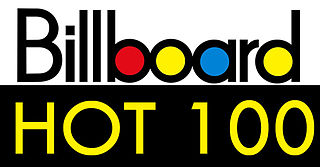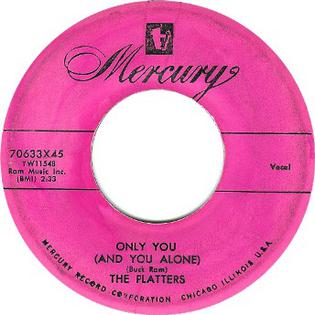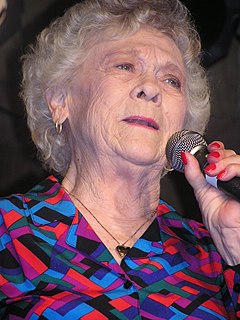
"Unchained Melody" is a 1955 song with music by Alex North and lyrics by Hy Zaret. North wrote the music as a theme for the little-known prison film Unchained, hence the song title. Todd Duncan sang the vocals for the film soundtrack. It has since become a standard and one of the most recorded songs of the 20th century, most notably by the Righteous Brothers in July 1965. According to the song's publishing administrator, over 1,500 recordings of "Unchained Melody" have been made by more than 670 artists, in multiple languages.

The Billboard Hot 100 is the music industry standard record chart in the United States for songs, published weekly by Billboard magazine. Chart rankings are based on sales, radio play, and online streaming in the United States.

"Only You " is a pop song composed by Buck Ram. It was originally recorded by The Platters with lead vocals by Tony Williams in 1955.
"The Bus Stop Song" is a popular song. The title references the movie, Bus Stop, in which it was introduced.
"Memories Are Made of This" is a popular song about nostalgia written by Terry Gilkyson, Richard Dehr, and Frank Miller in 1955.
"A Poor Man's Roses " is a song was written by Bob Hilliard (lyricist) and Milton De Lugg (composer). The song was popularized by both Patsy Cline and Patti Page in 1957. Patti Page recorded the song again in 1981.

Hot Country Songs is a chart published weekly by Billboard magazine in the United States.
"My Little Angel" is a popular song, published in 1956. "My Little Angel" was the flip side to "Standing on the Corner".
"A House with Love in It" is a popular song composed by Sidney Lippman with lyrics by Sylvia Dee. The song was published in 1956.

Ollie Imogene "Jean" Shepard was an American honky-tonk singer-songwriter who pioneered for women in country music. Shepard released a total of 73 singles to the Hot Country Songs chart, one of which reached the number-one spot. She recorded a total of 24 studio albums between 1956 and 1981, and became a member of the Grand Ole Opry in 1955.
"Young Love" is a popular song, written by Ric Cartey and Carole Joyner, and published in 1956. The original version was recorded by Ric Cartey with the Jiva-Tones on November 24, 1956. It was released in 1956 by Stars Records as catalog number 539 and one month later by RCA Records as catalog number 47-6751. Cartey's version never charted.

"Love Potion No. 9" is a song written in 1959 by Jerry Leiber and Mike Stoller. It was originally performed by the Clovers, who took it to number 23 on the US as well as R&B charts that year.
"He'll Have to Go" is an American country and pop hit recorded on October 15, 1959, by Jim Reeves. The song, released in the fall of 1959, went on to become a hit in both genres early in 1960.
"Happiness Street " is a popular song written by Edward White and Mack Wolfson and published in 1955.
"Standing on the Corner" is a popular song written by Frank Loesser and published in 1956. It was introduced by Shorty Long, Alan Gilbert, John Henson, and Roy Lazarus in the Broadway musical, The Most Happy Fella.
"I Love You Because" is a song written and recorded by country music singer and songwriter Leon Payne in 1949. The song has been covered by several artists throughout the years, including hit cover versions by Al Martino in 1963 and Jim Reeves in 1964.

Bill is a studio album by American country singer-songwriter Bill Anderson. It was released in July 1973 on MCA Records and was produced by Owen Bradley. It was Anderson's first studio album to be released on the MCA label after Decca Records merged with the label. It was also his twenty first studio recording to be released and only album project to be issued in 1973. The album included three singles, two of which became number one hits in either the United States and Canada. The album itself also would reach peak positions on national publication charts.

The discography of American country artist Wynn Stewart contains 11 studio albums, nine compilation albums, 50 singles and one charting B-side single. Stewart signed his first recording contract in 1954, releasing his debut single, "I've Waited a Lifetime." He then briefly signed with Capitol Records, where he had his first charting single with "Waltz of the Angels." The song was a major hit, reaching number 14 on the Billboard Hot Country and Western Sides chart in 1956. His follow-up singles to the hit were not a commercial success and Stewart left Capitol. Stewart then signed with Challenge Records where he adapted a new country style. In 1959, his single "Wishful Thinking" became a major hit. The song was his first to reach the top ten on the country chart, peaking at number five in March 1960. Also in 1960, his duet with Jan Howard became a minor charting single. By December 1961, "Big, Big Love" became his third major hit, climbing to number 18 on the Billboard country chart.

The singles discography of American Jazz artist Sarah Vaughan contains 89 singles, two promotional singles and seven other charted songs. Vaughan recorded her first singles in 1946, with her first release being "If You Could See Me Now". Soon after, she her first major chart success on the Billboard pop list with "Tenderly" and "It's Magic." Moving to Columbia Records, she had further pop hits in the late 1940s with covers of "Black Coffee" and "Nature Boy." She had her second top ten hit in 1950 with "(I Love the Girl) I Love the Guy." Vaughan moved to Mercury Records during the 1950s and recorded more pop music. At Mercury, she had her biggest chart success, with the top ten hits "Make Yourself Comfortable" and "Whatever Lola Wants." In 1959, Vaughan's single "Broken Hearted Melody" reached number seven on the Billboard pop chart and became an international success, becoming the biggest single of her career.








